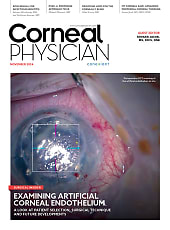This article was originally published in a sponsored newsletter.
As medical students, residents, and fellows, we are eternally driven by the next goal. We think: I need to get a 240 on my boards, I need to write 10 papers, I need to do 500 surgeries, so that I will get great training and become a great doctor; so that people will think that I am good; so that my parents will think that I am good; so that I will think that I am good; so that I will be deserving of a great job.
And then we land our first job, maybe get married, maybe have kids, maybe lose a parent or friend, and suddenly, the goalposts start moving around unpredictably. What, or who, am I doing all of this for? What am I trying to achieve?
I vividly remember walking out of Bascom Palmer on my last day of retina fellowship feeling like Morgan Freeman in The Shawshank Redemption: I was out on parole after 15 years in confinement (though, honestly, I loved most steps of my training); what do I do with myself now?
WHAT DO YOU LOVE?
Pause and take a breath; think deeply about and write down what you really love. For me it’s variety. It’s challenge. It’s solving problems. It’s people. It’s a goal of making everything I touch better. But it’s also about loving my family, being a good husband, brother, son, father, and colleague. It’s about continually getting better at my jobs, but also about exposing my children to the wonders of life through experiences and travel. It’s also about learning from my super-talented wife and supporting her at home and in her work endeavors. It’s also about not forgetting what I loved to do growing up—I have always loved music, and it brings me great joy to be singing in choirs in NYC and to be taking guitar lessons now. If I’m doing all of these things, then my life will be in balance.
WHAT DO YOU HATE?
Sometimes, this is hard to define. For example, I don’t love all the administrative work and meeting time that comes with my leadership positions, but I recognize that they are necessary for me to achieve my goals of building a great residency program, teaching the right principles to my trainees, and partnering with different people in different systems to build new programs that change the way we learn and interact. Time is an increasingly precious commodity the busier you get, and I hate things that take up time and don’t help me achieve my primary goals. These things I (try) not to commit to.
A SIMPLE STRATEGY
I definitely don’t have it all figured out, but I think that’s all there is to work-life balance: Do the things that you love. Take a moment to remember why you love them. Tolerate the things that contribute to what you love. Cut out the rest. See if you’re happy. Keep reassessing every few years to make sure that life circumstances haven’t changed your trajectory or your priorities. NRP








